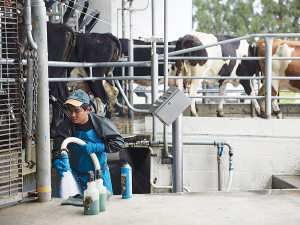OPINION: Two years into Covid and New Zealand dairy farmers are still struggling to get skilled farm workers from overseas.
The urgent need of 1,500 overseas workers hasn't come through lack of effort on the part of farmers.
In fact, the Agriculture Minister and the Minister for Primary Industries cannot be blamed either.
Farmers - through DairyNZ, Dairy Women's Network, Federated Farmers and others - have been working behind the scenes with MPI and O'Connor for months.
In June 2021, the Government provided provisional approval for 200 international dairy workers to apply to enter New Zealand under a class exception scheme. This included a limit of 50 farm assistants, with the remaining positions to be filled by herd manager and asisstant manager.
Last month, the Government announced that more dairy farm assistants would be allowed across the border to meet strong demand on farms.
Farmers across the country have been asking for boots on the ground to help milk and feed livestock and the dairy assistant is the right role for doing this.
Sadly, very few farmers have been overseas workers land on their farms, almost eight months since the first announcement.
The fingers must be pointed directly at MIQ, a Government-run scheme providing quarantine facilities for overseas arrivals.
While the border exception is just the first part of this process: farmers and their potential workers have to sort MIQ, flights and all the associated paperwork.
This is not an easy or cheap task for either party, but with unemployment at such low levels, this is really the only option for many of the primary industries at the moment.
The lack of MIQ spaces is undoing all the hard work done by farmers, workers and their industry groups to secure visas.
And many dairy workers have been given up on coming to New Zealand because they couldn't line up flights with an MIQ booking.
That's why the call to tie border exemptions to an MIQ allocation is the one way forward. The Government could also give migrant workers the chance to safely quarantine on-farm, an inherently remote area away from large populations.
Bringing in migrant dairy workers is a win-win: the local industry gains skills and innovation, while extra hands on the farm allow farmers more time off.
The industry cannot sustain another season without overseas workers. Unless the Government acts now, the coming calving and mating season could be a tricky one.


















